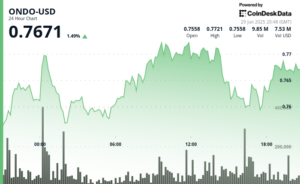The Future of Data Availability: Exploring Yakovenko’s Vision for a Meta-Blockchain
In the rapidly evolving landscape of blockchain technology, Solana co-founder Anatoly Yakovenko has introduced a groundbreaking concept: the development of a meta-blockchain aimed at enhancing data availability. This innovative approach seeks to streamline the way data is stored and accessed across various blockchain networks, thereby addressing long-standing challenges associated with data availability in the digital space.
A New Paradigm in Blockchain Architecture
Yakovenko’s vision for a meta-blockchain signifies a shift in how blockchain networks handle data. By leveraging a meta-blockchain structure, users can post data across multiple chains, selecting the most cost-effective option available. This not only optimizes resource allocation but also enhances the overall efficiency of data transactions. As blockchain technology matures, the demand for solutions that improve data management becomes increasingly critical, positioning Yakovenko’s proposal as a timely and essential innovation in the industry.
Overcoming Data Availability Challenges
One of the primary concerns within blockchain ecosystems is data availability. Traditional blockchains often struggle with slow transaction speeds and high fees, which can hinder their effectiveness. Yakovenko’s meta-blockchain aims to mitigate these issues by providing a framework where data can be easily transferred and accessed on any participating chain. This interconnected network offers a solution to the bottlenecks that frequently plague individual blockchain systems, enabling smoother and more efficient operations.
Cost-Effectiveness and Flexibility
The ability to determine the lowest-cost option for data posting empowers users and businesses to make informed decisions. With the meta-blockchain concept, the flexibility in choosing where to store data means that users are not locked into one specific chain and its associated costs. This adaptability is crucial for businesses aiming to minimize expenses while maximizing data accessibility. As a result, the meta-blockchain could serve as a catalyst for increased adoption of blockchain technology among enterprises hesitant due to existing cost barriers.
Enhancing User Experience with Improved Accessibility
Data availability is not just a backend issue; it significantly impacts user experience. By building a meta-blockchain, Yakovenko envisions a framework that enhances accessibility for developers and end-users alike. Improved data availability means faster application performance and reduced wait times, making blockchain-based solutions far more appealing. With a seamless user experience at its core, this meta-blockchain could pave the way for broader acceptance of blockchain technologies across various industries.
The Future of Blockchain Collaboration
Yakovenko’s call for the creation of a meta-blockchain underscores the importance of collaboration among blockchain networks. As various chains often compete with one another, fostering an environment of cooperation can lead to more robust solutions. The proposed meta-blockchain framework encourages communication and data sharing between networks, ultimately driving innovation and improving data availability in the digital space. This cooperative spirit is essential for the future growth and sustainability of blockchain technology.
In conclusion, Anatoly Yakovenko’s vision for a meta-blockchain represents a significant advancement in the quest for improved data availability within the blockchain ecosystem. By addressing the challenges of data management and reducing costs, this innovative structure has the potential to reshape how businesses and users interact with blockchain technology. As we look ahead, it is clear that the meta-blockchain could play an essential role in the future of digital data management.

















